|
|
|
Sort Order |
|
|
|
Items / Page
|
|
|
|
|
|
|
| Srl | Item |
| 1 |
ID:
114939
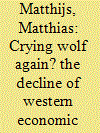

|
|
|
|
|
| Publication |
2012.
|
| Summary/Abstract |
Since the turn of the millennium, scholars and pundits have been musing over the decline of the West. The disappointing US military invasions in Afghanistan and Iraq, together with the subprime mortgage crisis, seem to be evidence of an abrupt end to America's 'unipolar' moment. In Europe, the sovereign debt crisis has amplified Europe's long-term structural economic problems and laid bare the fragile institutional foundation on which the Economic and Monetary Union was built. At the same time, the BRICs and other emerging economies have been growing at unprecedented rates. Those same analysts see a 'decoupling' in the world economy: the developing economies pulling the world out of recession, while the advanced industrial economies are unable to solve their domestic difficulties. So to them, the events of the past five years signify the beginning of the end of Western influence, eventually leading to a more complete rebalancing of the world economy's current 'Western' system of governance. This article argues instead that the West still has a significant edge when it comes to most critical factors that determine long-term economic growth potential, including technology, innovative capacity, research and development, investment climate and education. Furthermore, the transatlantic economy is less vulnerable than the rest of the world to outside economic shocks and might eventually prove more capable of reform than many expect. The current malaise in the transatlantic community might therefore prove once again to be more cyclical than structural. Relying on linear projections, many are 'crying wolf' again, too loud and too soon.
|
|
|
|
|
|
|
|
|
|
|
|
|
|
|
|
| 2 |
ID:
141848
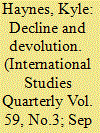

|
|
|
|
|
| Summary/Abstract |
This paper offers a theory of military retrenchment by states in relative decline. I argue that a declining state will choose to withdraw foreign military deployments and security commitments when there exists a suitable regional “successor” to which it can devolve its current responsibilities. The degree of a successor's suitability and the strategic importance of the region to the declining state interact to determine when and how rapidly retrenchment will occur. Importantly, this devolutionary model of retrenchment predicts significant variations in retrenchment patterns across a declining state's multiple regional commitments. It advances the literature by producing nuanced predictions of precisely where, when, and how quickly retrenchment will occur. This paper assesses the theory empirically through an examination of Great Britain's varying regional retrenchment strategies prior to World War I.
|
|
|
|
|
|
|
|
|
|
|
|
|
|
|
|
| 3 |
ID:
141503
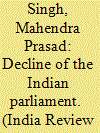

|
|
|
|
|
| Summary/Abstract |
Indian Parliament had a very promising start and worked well during the1950s-1960s. During the 1970s Parliament was squeezed by a great extra-parliamentary mass movement against authoritarianism and corruption and partial but crippling subversion of parliamentary-federal Constitution during the national emergency. Democracy was restored following the 1977 general elections. But the general decline of Parliament that set in the post-Nehru era has not yet been reversed. Major indicators of this decline are shortening sessions, time lost due to disruptions in proceedings by the opposition and violation of norms and precedents by the government, rampant absenteeism, actual hours of sitting as a percentage of available hours, phenomenon of weak legislative federalism via Rajya Sabha in the overall setting of parliamentary-federalism, challenges of new extra-parliamentary mass movements, and judicial activism. The new committee system introduced since 1993 is a welcome development. However, the parliamentary reforms recommended by the constitutional review commission (2002) remain unimplemented.
|
|
|
|
|
|
|
|
|
|
|
|
|
|
|
|
| 4 |
ID:
141355
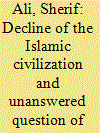

|
|
|
|
|
| Summary/Abstract |
Without clarifying the relationship between Islam and politics, we cannot achieve long-term stability in Muslim countries in the Middle East.
|
|
|
|
|
|
|
|
|
|
|
|
|
|
|
|
| 5 |
ID:
082929


|
|
|
|
|
| Publication |
2008.
|
| Summary/Abstract |
Is the United States inevitably in decline? After the foreign policy controversies of the George W. Bush years, a new consensus declares the end of American dominion. In this article this conventional wisdom is challenged. The US constitutes an 'exceptional empire' and, despite the recent rise of powers such as the EU, China and India, the four foundations of this distinctive empire remain robust. First, the US still exhibits global predominance in hard power. Second, the essentially unipolar international order shaped by Washington remains resilient. Third, neither the rise of 'anti-Americanism' nor the alleged decline of US 'soft power' endanger its predominance. Fourth, the US political class is committed to preserving American primacy after Bush. No other power is currently in range of competing with the US for global influence. Moreover, each faces powerful internal weaknesses and external threats at least as significant as those facing the US. America's global predominance in hard and soft power do not translate into omnipotence. Nor does predominance promise an error-free foreign policy. The US nonetheless continues to defy both history and theory
|
|
|
|
|
|
|
|
|
|
|
|
|
|
|
|
| 6 |
ID:
106345
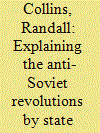

|
|
|
|
|
| Publication |
2011.
|
| Summary/Abstract |
A major area of advance in social science in recent decades has been the state breakdown theory of revolution. This is part of a larger body of theory about the rise of the modern state and the crises that can befall it along the way. It is sometimes referred to as the military/fiscal theory of the modern state, and as a branch of that larger theory, the state-centered theory of revolution. Here I will link military/fiscal theory of the state to geopolitical theory. Military/fiscal theory shows us the central mechanism, both of state growth and state breakdown; these are proximate causes, and further back in the causal chain are geopolitical conditions. Geopolitics tends to be the primer mover in any particular historical sequence, what sets off the changes that eventually lead to state growth or breakdown.
|
|
|
|
|
|
|
|
|
|
|
|
|
|
|
|
| 7 |
ID:
190452
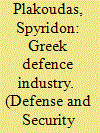

|
|
|
|
|
| Summary/Abstract |
Greece was never internationally renowned for its defence industry; in fact, its state-owned industries were usually a source of headaches rather than income for Athens. The Debt Crisis (2008-18) compounded the chronic ills of the Greek defence ecosystem which appeared to decline irreversibly. And yet, in recent years they rebounded and reached new heights. How can this surprising turnaround be explained? And what does it indicate for the future of the Greek defence industry? This paper aspires to examine how the Greek defence ecosystem (state- and private-owned) evolved from a stage of stagnation and decline into a phase of stabilisation.
|
|
|
|
|
|
|
|
|
|
|
|
|
|
|
|
| 8 |
ID:
156792
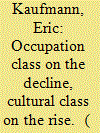

|
|
|
|
|
| Summary/Abstract |
In The New Politics of Class (NPC), Geoffrey Evans and James Tilley lay out a comprehensive new sociology and politics of class in Britain based on detailed empirical analysis of the foremost social surveys in the country. A strength of the book is that it provides a one-stop reference guide to social and political trends concerning class since surveys began in the 1960s. This is outlined in some fifty handy and well-crafted figures. For this reason alone, the book should be required reading for students of British politics.
|
|
|
|
|
|
|
|
|
|
|
|
|
|
|
|
| 9 |
ID:
172375
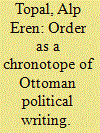

|
|
|
|
|
| Summary/Abstract |
This article proposes the concept of order as a major chronotope of Ottoman political writing which has shaped temporal projections such as decline and renewal from the seventeenth century onwards. In chronological order, I discuss the seventeenth-century debates on breakdown of social order and emergence of the sense of decline, and the eighteenth-century literature on Khaldunian concept of nomadic versus sedentary forms of habitation and spatiality of the debates over moral degeneration. The urban space of Istanbul, both material and abstract, as a political and social setting also figures prominently in these discussions and shapes Ottoman perceptions of the European city. Through a discussion of the chronotope of order I also challenge pervasive narratives of Westernisation and progress in favour of indigenous cyclical narratives of restoration and renewal.
|
|
|
|
|
|
|
|
|
|
|
|
|
|
|
|
| 10 |
ID:
127858
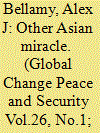

|
|
|
|
|
| Publication |
2014.
|
| Summary/Abstract |
East Asia has a long history of genocide and mass atrocities. For much of the Cold War, East Asia was one of the world's most violent regions, experiencing multiple outbursts of mass killing. Since the end of the Cold War, however, the region has been transformed thanks to another Asian miracle. There are now fewer cases of genocide and mass atrocities in East Asia today than at any point in history for which we have reliable records. This article demonstrates and then tries to account for the dramatic decline of mass atrocities in East Asia. It argues that the decline was enabled by a combination of three major structural changes: reduction in the selection of mass atrocities as a weapon of war, increase in incomes, and progress towards democratization combined with the emergence of new ideas about sovereignty and their accommodation with existing principles of non-interference. Together, these structural and ideational changes created a changed regional context of increased costs and reduced payoffs for the commission of mass atrocities.
|
|
|
|
|
|
|
|
|
|
|
|
|
|
|
|
| 11 |
ID:
086397
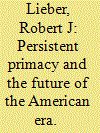

|
|
|
|
|
| Publication |
2009.
|
| Summary/Abstract |
Arguments are widely expressed that America is in decline, both at home and abroad. These admonitions extend not only to economic, diplomatic and geopolitical realms, but even to the cultural arena. The United States does face real and even serious problems, but there is an unmistakable echo of the past in current arguments. Antecedents of these views were evident in the 1970s, '80s and '90s, and on occasion even in identical language. Indeed, declinist proclamations have appeared on and off not only throughout the 20th Century, but also during the 18th and 19th Centuries. Moreover, periodic crises in US history have included challenges more daunting than those of today. It can thus be instructive to compare the arguments and prescriptions of the new declinism with those of earlier eras. The evidence suggests a pattern of over-reaction, a historicism, and a lack of appreciation for the robustness, adaptability and staying power of the United States.
|
|
|
|
|
|
|
|
|
|
|
|
|
|
|
|
| 12 |
ID:
169779
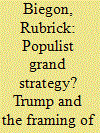

|
|
|
|
|
| Summary/Abstract |
What is the role of ‘populism’ in Donald Trump’s foreign policy? Defining populism as a framing style that constructs antagonisms around ‘the people’ and their adversaries, this article explores Trump’s rhetoric in relation to his efforts to shift US grand strategy away from its traditional investment in the liberal international order. Based on an approach grounded in the ontological commitments of critical discourse analysis, it examines three interlocking frames: (1) the ‘corrupt’ elites of the establishment ‘swamp’; (2) the anti-globalist, ‘America first’ agenda; and (3) poor deal-making responsible for the United States ‘losing’ in international affairs. In responding to declinist themes and anxieties, Trump’s populist rhetoric frames a Jacksonian ideological approach based on nationalism, mercantilism and a reliance on coercive power.
|
|
|
|
|
|
|
|
|
|
|
|
|
|
|
|
| 13 |
ID:
106792
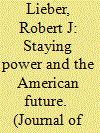

|
|
|
|
|
| Publication |
2011.
|
| Summary/Abstract |
Many scholars, strategists and pundits contend that the US is in decline. They argue that America's national capabilities are significantly eroding, and that with the rise of important regional powers, its primacy in world affairs is rapidly diminishing as well. Yet America continues to possess significant advantages in critical sectors such as economic size, technology, competitiveness, demography, force size, power projection, military technology, and in the societal capacity to innovate and adapt. This article argues that the nature of material problems has been overstated, and that the US should be able to withstand modest erosion in its relative strength for some time to come without losing its predominant status. Instead, where limits to American primacy do exist, they are as or more likely to be ideational as they are material. The problem inheres as much or more in elite and societal beliefs, policy choices, and political will, as in economic, technological or manpower limitations at home, or the rise of peer competitors abroad.
|
|
|
|
|
|
|
|
|
|
|
|
|
|
|
|
| 14 |
ID:
154809


|
|
|
|
|
| Summary/Abstract |
The foreign policy crises that the USA has confronted under the administration of President Barack Obama have generated profound uncertainty about whether the USA can maintain what has been its consistent grand strategy since the end of the Cold War: primacy. The authors argue, drawing on a neoclassical realist framework, that this uncertainty has been driven not so much by fundamental changes in the international system itself, but rather by how such changes have been interpreted by the Obama administration and its critics. US grand strategy is now caught between approaches best described as the ‘decline management’ of the Obama administration and the ‘decline denial’ of president Donald Trump, which reflects the fracturing of the domestic ‘political support system’ that has underpinned primacy since the end of the Cold War.
|
|
|
|
|
|
|
|
|
|
|
|
|
|
|
|
| 15 |
ID:
166649
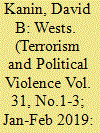

|
|
|
|
|
| Summary/Abstract |
The ebbing power of the United States signals the end of the period in which a series of “Wests” have created, globalized, and dominated an international order. Each “West” has had its own norms of authority and coercive utopia, but they shared in common the projection of a sense of modernity, technical proficiency, and inevitable, invincible authority. The two current Wests, the European Union and the United States, boast a partial normative overlap but have different creation myths. American fumbling of its hegemonic moments highlights the narrowing of room for error that defines decline. Still, decline does not necessarily lead to collapse, and skillful management could mitigate its effect. In part, this depends on whether Washington can come to rely less on neo-Wilsonian nostrums and more on the creative side of the American record.
|
|
|
|
|
|
|
|
|
|
|
|
|
|
|
|
|
|
|
|
|